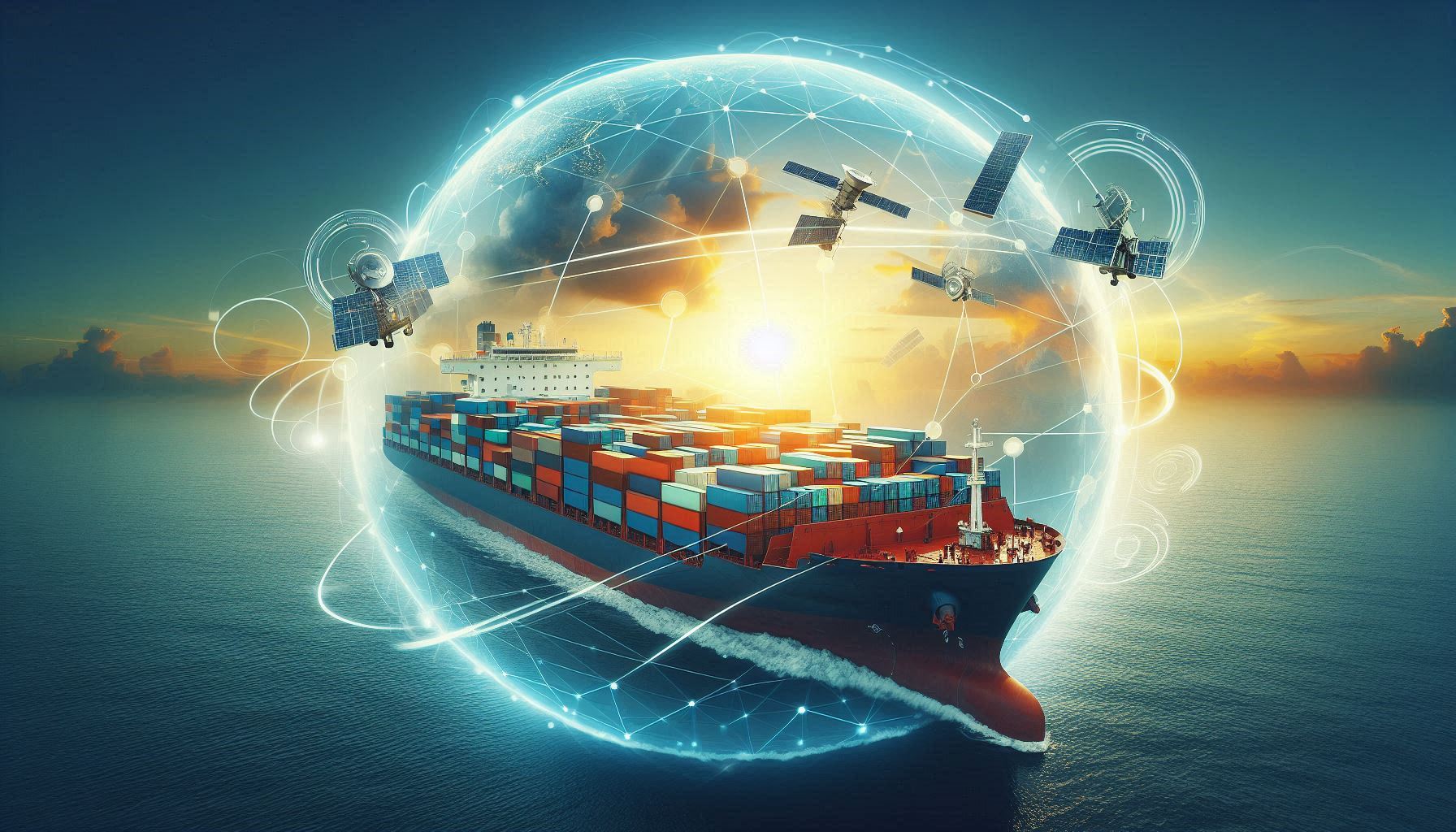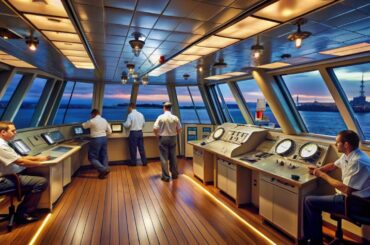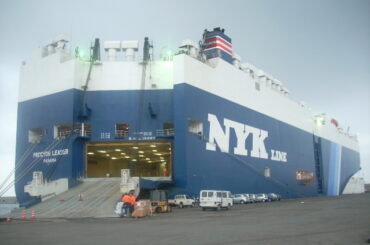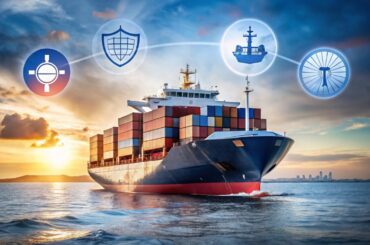To understand how ship container tracking is achieved, consider the intricate web of technologies involved. From GPS guiding vessels across vast oceans to satellite communication ensuring connectivity worldwide, the process is a sophisticated blend of innovation. Integrating RFID tags and IoT systems allows for meticulous monitoring of cargo, offering insights into inventory management. But how do all these components seamlessly come together to provide precise real-time data on shipments? Let’s uncover the intricate mechanics behind modern-day maritime tracking methods.
GPS Technology in Ship Tracking
When it comes to tracking ship containers, GPS technology plays a pivotal role in providing real-time location data and guaranteeing the efficient movement of goods across the globe. The accuracy of GPS in maritime navigation enables precise tracking of vessels, optimizing vessel routing for increased efficiency.
By integrating GPS systems, companies can monitor their containers in transit, overcoming tracking challenges such as theft and unauthorized diversions. The global positioning capabilities of GPS technology allow for geofencing applications, enabling companies to set virtual boundaries and receive alerts if containers deviate from their intended routes.
This enhances tracking efficiency and security measures. System integration of GPS with other tracking technologies enhances data accuracy and provides a thorough view of container movements.
Despite its benefits, challenges such as signal interference in certain regions can affect GPS accuracy. Companies must continually evaluate and update their tracking systems to guarantee reliable tracking of containers worldwide.
To summarize, GPS technology is indispensable in modern ship container tracking, facilitating precise location data, efficient vessel routing, and enhanced security measures.
Satellite Communication for Tracking
Ship container tracking relies heavily on satellite communication for effective monitoring and management of cargo shipments. Satellite positioning plays a significant role in providing real-time location data of containers at sea.
Communication networks utilizing satellites enable continuous tracking, allowing companies to have a thorough view of their shipments’ locations globally.
Satellite communication guarantees that even in remote areas where traditional communication may be limited, containers can still be tracked accurately. This technology facilitates seamless updates on the status and movement of containers, enhancing supply chain visibility and security.
By leveraging satellite communication for tracking, companies can proactively monitor and manage their cargo shipments, optimizing routes and schedules based on real-time data.
This strategic approach minimizes the risk of delays, theft, or loss, ultimately improving operational efficiency and customer satisfaction.
RFID and IoT Integration
Integrating Radio Frequency Identification (RFID) technology and Internet of Things (IoT) systems into ship container tracking processes revolutionizes the way companies manage their cargo shipments. This integration offers a range of benefits and challenges that need to be carefully considered:
- RFID Applications: RFID tags attached to containers allow for real-time tracking and monitoring of shipments, improving inventory management and reducing human error.
- IoT Benefits: IoT systems enhance visibility throughout the supply chain, enabling proactive decision-making and optimizing route planning for efficient shipping operations.
- RFID Challenges: Ensuring RFID standards compliance and overcoming limitations such as read range and interference are vital to maximizing the technology’s potential in container tracking.
- IoT Security and Scalability: Implementing robust cybersecurity measures is essential to protect data transmitted by IoT devices, while ensuring scalability to handle the vast amount of information generated in logistics processes.
Data Analytics for Monitoring
By leveraging data analytics for monitoring in ship container tracking, companies can extract valuable insights to optimize logistics operations and enhance overall efficiency.
Data visualization plays an essential role in presenting complex information in a clear and actionable manner. Through interactive dashboards and reports, stakeholders can easily interpret trends, spot anomalies, and make data-driven decisions.
Predictive analytics further empowers organizations to forecast potential issues, such as delays or disruptions, allowing proactive measures to be taken to mitigate risks and streamline processes.
Utilizing historical data, predictive models can anticipate maintenance needs, optimize routes, and improve resource allocation.
By continuously analyzing data from various sources like sensors, GPS, and weather forecasts, companies can enhance supply chain visibility and responsiveness. This strategic approach enables real-time monitoring of container conditions, ensuring goods are transported securely and efficiently.
Real-time Tracking Solutions
For seamless operational oversight and enhanced efficiency in container tracking, real-time tracking solutions play a pivotal role.
Leveraging mobile tracking technologies can greatly improve container management processes, ensuring timely deliveries and reducing operational costs.
Here’s how real-time tracking solutions can benefit your container tracking operations:
- Instant Location Updates: Receive real-time location data of your containers, enabling you to track their movements accurately.
- Enhanced Security: Monitor your containers continuously, reducing the risk of theft or unauthorized access during transit.
- Optimized Route Planning: Utilize real-time data to plan the most efficient routes, minimizing fuel consumption and transportation time.
- Cost Efficiency: By streamlining operations with real-time tracking, you can reduce manual labor costs and improve overall operational efficiency, leading to cost savings.
Implementing real-time tracking solutions not only offers visibility into your container shipments but also enhances your operational capabilities while driving cost-efficiency.
Frequently Asked Questions
How Do Shipping Companies Handle Tracking in Case of Signal Loss?
When signal loss occurs, shipping companies facilitate signal recovery through backup systems. Advanced tracking technology, like satellite and GPS, allows for real-time monitoring. These measures guarantee continuous visibility of containers, enhancing security and efficiency in logistics operations.
Can Ship Containers Be Tracked in Extreme Weather Conditions?
In extreme weather conditions, tracking ship containers poses challenges. Signal disruptions may occur, affecting real-time updates. Companies navigate this by employing robust tracking systems, satellite technology, and predictive analytics to guarantee accurate and timely monitoring.
What Measures Are Taken to Ensure the Security of Tracking Data?
To safeguard tracking data, stringent encryption methods are employed. Data privacy is a top priority, ensuring secure transmission and storage. Multiple layers of security protocols are implemented to protect sensitive information from unauthorized access, enhancing overall data security.
Are There Any Regulations Governing the Use of Tracking Technologies?
To guarantee regulatory compliance and data privacy, you must adhere to governing regulations on tracking technologies. Implement secure measures to protect sensitive data. Stay informed about evolving standards to maintain compliance and safeguard privacy of tracking information.
How Do Shipping Companies Handle Tracking in Remote Areas With Poor Connectivity?
In remote areas with poor connectivity, shipping companies navigate tracking challenges using satellite technology. They strategically address GPS limitations by investing in alternative systems for accurate container monitoring, ensuring efficient logistics management despite challenging environments.







